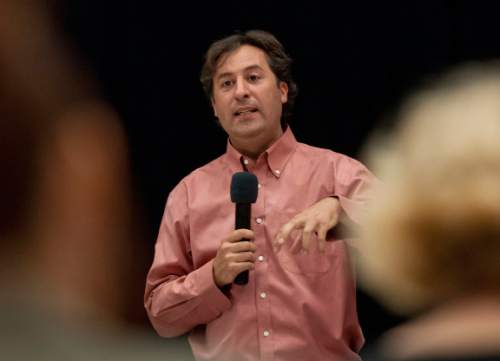This is an archived article that was published on sltrib.com in 2015, and information in the article may be outdated. It is provided only for personal research purposes and may not be reprinted.
It wouldn't exactly yield Emerald City, but a 12-month moratorium on impact fees on new development as proposed by Mayor Ralph Becker could spur development in Salt Lake City above the current boom.
The proposal is being considered by the City Council in a campaign season when the topic has become hot. Becker and his election challenger, Jackie Biskupski, seek lower impact fees that are more competitive with other Wasatch Front municipalities.
Impact fees are assessed on new developments in an effort to keep service levels from shrinking as the population grows. Without impact fees, existing residents and businesses would have to pick up the tab for services to remain at the same level. The alternative to such property-tax hikes would be to cut back spending on such things as parks, roads and public safety.
A moratorium on impact fees is interesting, says City Councilman Kyle LaMalfa, because it would be an incentive to developers at a time when Salt Lake City is undergoing an urban makeover.
"It's not just about our financial future," he said. "It's about becoming a metropolis. ... Salt Lake City could become the cosmopolitan center of the West."
The question surrounding such a moratorium, LaMalfa said, is whether existing businesses and residents are willing to bear a greater burden for such growth.
By contrast, Jill Love, community and economic development director, said the moratorium is not about providing growth incentives, but rather a timeout to devise better ways of collecting and spending impact fees.
"We're not trying to jump-start an economy that is already booming," she said. "Our motivation is that we have heard from the business community that our methodology could be better."
Love also said that the city has enough impact-fee revenue on hand that services would not suffer during a 12-month moratorium.
Biskupski has said she would reduce impact fees to bolster the overall economy. She didn't provide specifics, but she said a fee reduction would attract new business that would, in turn, stoke the business climate in the capital city.
At a Tuesday City Council work session, a consultant rolled out a sophisticated mechanism that would produce an impact-fee schedule such that new growth would pay for increased service demands.
That report is due by year's end.
But Council Chairman Luke Garrott said municipalities have long known how to properly assess impact fees.
In a Salt Lake Tribune op-ed column last week, Garrott criticized both mayoral candidates for proposing reductions in development fees.
"Impact fees are a mechanism for tax justice and are highly regulated by Utah code," he said. Fee reductions will shift more of the cost of new development onto existing city taxpayers.
"The two candidates are not willing to admit that," Garrott said, "choosing instead to pander to developers."
Garrott concedes, however, that the city does a poor job of coordinating impact fees with construction projects.
"We use them legally," he said. "But we don't use them strategically."
Garrott added that he didn't agree with LaMalfa's suggestion that new growth would vault Salt Lake City to new heights as a regional center.
"All growth is not good growth," he said, referring to some new high-rise housing projects that he characterized as less than impressive. "I don't want any faster growth. I want better growth."
The council is slated to continue its policy discussion on impact fees in the coming weeks. A vote on the proposed moratorium is tentatively set for Oct. 20 — just two weeks before the election.



